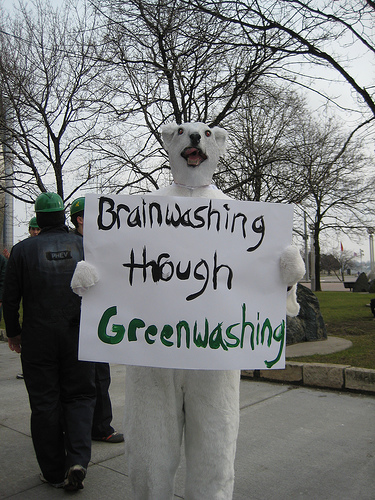 We’ve been getting some good press lately about how GM’s public relations people decided to turn off some features on gmnext.com and hold a special forum in response to our supporters’ concerns about their environmental practices (they also killed some of the images we uploaded before they ever went live). GM poured untold resources into creating this site in part to improve their environmental image; our online supporters forced them to scale it back considerably inside of a month.
We’ve been getting some good press lately about how GM’s public relations people decided to turn off some features on gmnext.com and hold a special forum in response to our supporters’ concerns about their environmental practices (they also killed some of the images we uploaded before they ever went live). GM poured untold resources into creating this site in part to improve their environmental image; our online supporters forced them to scale it back considerably inside of a month.
This sort of online marketing is a real priority for them. From the Detroit News:
Two dozen company executives conducted chats on the site last month, including GM Chairman and CEO Rick Wagoner. “We give a lot of importance to Web sites,” Wagoner wrote. “In fact, we have shifted a significant amount of our marketing spend to digital marketing. We’re also devoting a lot of our communications resources to social media.”
GM has also routinely invited bloggers to company press events and to meet with top executives.
Clay Voorhes, an assistant professor of marketing at Michigan State University, said the effort by GM is “part of a new push for authenticity by companies.”
A recent article in the Globe and Mail (not online) seemed to buy into the idea that GM was really trying for “authenticity.” The reality, however, is that these companies are making a push for the appearance and aesthetic of authenticity, not for authenticity itself. When the latter rears its sometimes-ugly head, they back off. In another article from the Financial Times, a spokesman states that their goal is “credibility:”
GM set up the website www.gmnext.com only last month as a springboard for ideas on future automotive technologies. The site was immediately bombarded by the carmaker’s critics. Posts included pictures of protestors at the Detroit motor show calling on the industry to combat climate change and to create more environmentally friendly jobs.
…
“We want to get as many voices in this debate as possible,” a company spokesman said. He added that: “We can’t just pick the friendly questions if we want this to be a credible conversation.”
So here’s the question for GM’s greenwashing crew: can they allow enough public feedback to appear “credible” while still avoiding uncomfortable criticism from knowledgeable, organized environmentalists? Here’s a hint: it might require making real, substantive changes outside of the PR department.